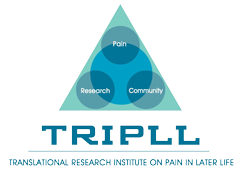Pain and Aging: Measurement, Mechanisms, and Management
IAGG 2017 Pre-Conference Workshop
Conference Description
TRIPLL co-hosted a pre-conference workshop on July 23rd, 2017 as part of the IAGG World Congress in San Francisco, California. Sessions addressed a wide range of topics in pain and aging, including epidemiology, biological mechanisms, psychosocial and behavioral contributions, and medical and non-medical management approaches. Click here to view workshop eBrochure. Scroll down for more information regarding the conference rationale.
Leading experts from around the world provided timely and evidence-based information regarding pain and aging. The workshop included abundant time for discussion and networking, with opportunities to interact with speakers and with each other. Click here to view the full workshop agenda.
Click on the links below to download copies of the PowerPoint presentations.
Welcome & Introductions by Roger Fillingim, PhD and Cary Reid, MD, PhD.
Session 1: Epidemiology and Assessment of Pain in Older Adults
- Epidemiology of Pain by Stephen Gibson, PhD
- Assessment of Pain by Keela Herr, PhD, RN
- Assessing Pain Modulation by Joseph Riley, PhD
Session 2: Biopsychosocial Contributions to Pain in Older Adults
- Pain and Depression by Pat Parmelee, PhD
- Pain and Cognitive Function by Miriam Kunz, PhD, PD
- Disparities in Pain by Tamara Baker, PhD
Session 3: Pain and Comorbidities Among Older Adults
- Pain and Mobility/Falls by Pat Schofield, PhD
- Sleep and Pain by Michael Smith, MA, PhD
Session 4: Treatment of Pain in Older Adults
- Pharmacological Treatment by Benny Katz, MB, BS, FRACP
- Non-Pharmacological Treatment by Cary Reid, MD, PhD
Session 5: Incorporating the Social and Behavioral Sciences
- A Life Course Perspective on Pain Research by Elaine Wethington, PhD
Conference Rationale
Later life pain is a worldwide problem that adversely affects older adults in developed and developing countries. It is associated with substantial disability, characterized by reduced mobility, activity avoidance, increased risk of falls, and psychosocial morbidity, including depression, anxiety, and social isolation.
Chronic pain also poses a significant economic burden at a societal level. One analysis revealed that the annual cost of pain in the United States was nearly 30% higher than the costs of cancer and diabetes combined. Chronic pain conditions are also leading causes of disability. Low back pain is responsible for more years lived with disability than any other condition worldwide, and chronic pain conditions account for three of the top four causes of years lived with disability.
While chronic pain affects individuals across the lifespan, older adults are at increased risk, particularly from musculoskeletal and neuropathic pain disorders. Surprisingly, pain among older adults remains poorly understood, and there is an urgent need to inform practitioners, educators, and researchers about this increasingly important topic.

